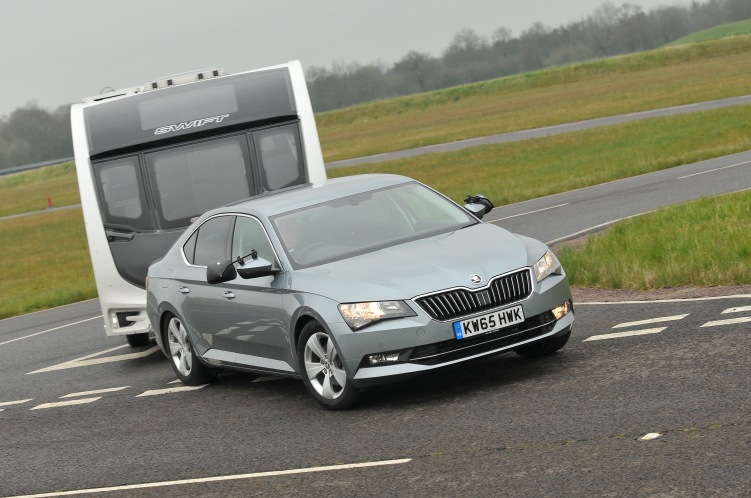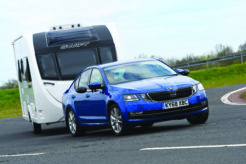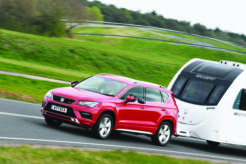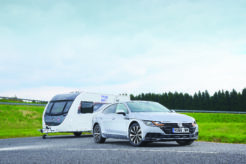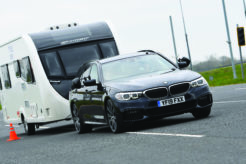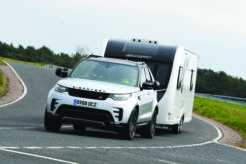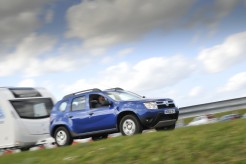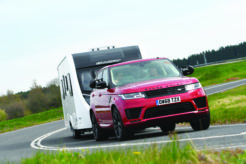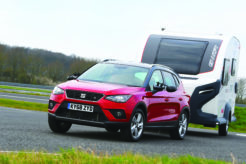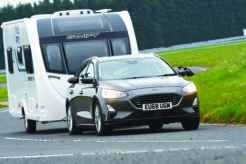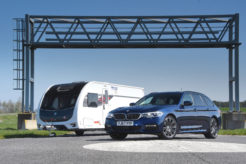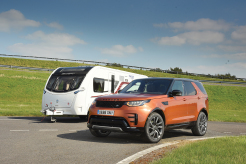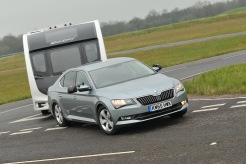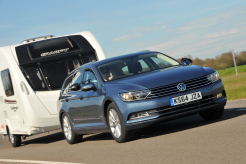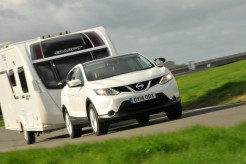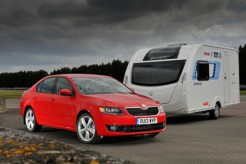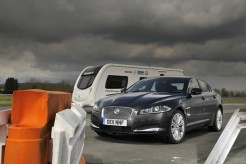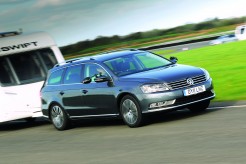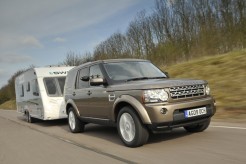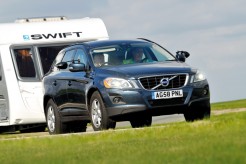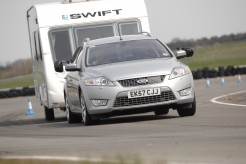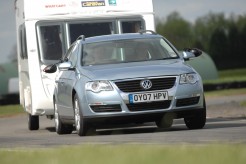There’s no shortage of talent in our second weight class, so to win the Skoda Superb has really had to prove itself.
As a tow car, it lives up to its name. Stability at speed is excellent, with only the slightest movements between 60 and 70mph when the wind was blowing.
The lane-change test often exposes weaknesses in cars which feel fine towing in a straight line, but the Superb put in a textbook performance. As we pushed harder and faster, the Skoda simply came back for more.
If you have to brake hard in an emergency, the Superb also does its best to keep you safe; the stopping distance of 10 metres exactly from 30mph is among the shortest recorded in this year’s tests.
There’s plenty of pulling power from the 2.0-litre diesel engine with its 251lb ft of torque, so long as the revs don’t drop too low. The Superb pulled a caravan weighing 85% of its kerbweight from 30-60mph in 13.5 seconds.
That pulling power came in handy for our hill-start test, too. The electronic parking brake held the car and caravan still on the 1-in-6 gradient and released smoothly. Pulling to the top of the slope needed some balance of clutch and throttle, but was refreshingly straightforward for a front-wheel-drive car with a manual gearbox.
Leave the caravan behind, and the Superb is a much better car to drive than the previous-generation model. It steers more crisply and corners more eagerly. Our car was fitted with Dynamic Chassis Control (a £750 option), and we found the ‘Normal’ setting struck a fine balance between comfort and control.
Inside, the Skoda Superb is simply huge. Rear-seat passengers have even more space to stretch out than in the Volkswagen Passat, and the hatchback’s 625-litre luggage capacity is bigger than that of many estate cars. Our practicality test team had no trouble finding space for a full load of holiday luggage. They also praised the tow bar installation and the fitment of a trailer stability system.
The Skoda’s value for money is the real clincher, though. Even if the Superb cost almost as much as last year’s overall winner, the VW Passat Estate, we’d have a hard time separating them. Given that it tows as well, has more room for passengers, almost as much luggage space and costs almost £6000 less, the Superb is a worthy winner.
It’s been a good year for new tow cars. Four out of five weight classes have new winners, and in many cases the judges had to argue long and hard over the merits of old favourites and new contenders.
Three of those four new class winners are five-star cars, combining exceptional towing ability and everyday driving prowess. One car stood out above the rest, though: the Skoda Superb Hatch.
It really is astonishing value. Only a handful of this year’s 41 cars cost less to buy than the Superb, yet the big Skoda has more rear legroom than cars costing twice as much. It may be a hatchback, but the luggage space it offers is greater than most estate cars’.
Being big and affordable wouldn’t count for much if the Superb didn’t tow well, but it’s brilliant with a caravan behind it. We’d happily pull a tourer or trailer from one end of the country to the other with the Skoda, such is its stability, performance and comfort.
Few drivers will ever need to push a car as hard as we do in our emergency manoeuvres, but every car goes through these violent tests to find out how it will perform in those white-knuckle moments every tow car driver hopes to avoid. The Superb aced every test, with data from the Al-Ko ATC trailer stability system confirming the impression of our test drivers.
In the lane-change, the Skoda kept the caravan under control and calmly stuck to its line, however much the driver pushed. The stopping distance from 30mph was one of shortest recorded this year, too.
Some will question whether a relatively light car should be the overall champion, but if you need a heavier car to tow with, look to one of our other category winners. Besides, a kerbweight of 1485kg is high enough to tow a wide variety of caravans and trailers. In particular, for an experienced driver happy to tow close to 100% of the car’s kerbweight, there’s plenty of choice.
The Skoda has enough poke to cope with a heavy van, too. Towing a van weighing 85% of the Skoda’s kerbweight, the Superb accelerated from 30-60mph in a brisk 13.5 seconds, so there’s performance in reserve for towing a heavier van. It’s an economical engine, too, with an official combined figure of 68.9mpg.
The Skoda Superb is spacious, great value, and brilliant to tow with. A worthy overall winner for 2016.





